Introducing Central Ontario's FIRST four-year Honours Bachelor of Science – Nursing program, launching September 2022.
Scroll down to meet our #GCHeroes
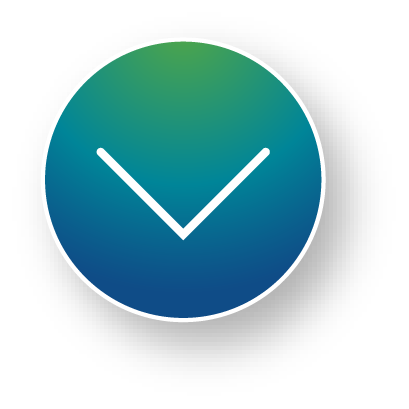
Scroll down to meet our #GCHeroes



“I grew up in a family that was afraid of postsecondary schooling. So many Indigenous Peoples never have the chance to pursue education. I think I have a responsibility to my community.”
BILODEAU.
“The pandemic hasn’t changed my view of nursing, but rather just solidified the strength I see in the nursing profession. Being part of this profession makes me proud.”
nursing student
“I grew up in a country that lacked infrastructure and amenities. I promised myself I would soar through these obstacles and rise above the limitations.”
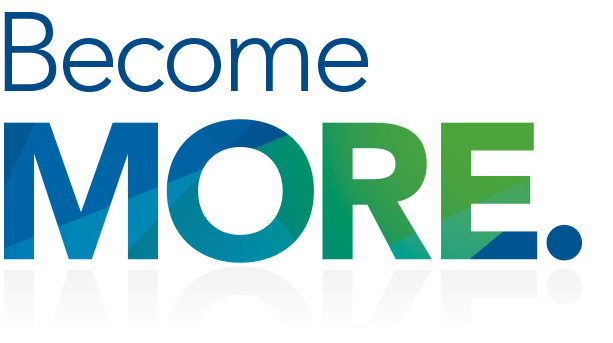
Honours Bachelor of Science – Nursing (BScN) program at Georgian College.
Study close to home and graduate with the advantage of more industry connections, hands-on practise and one-on-one training with small class sizes taught by expert faculty who care.
- Four-year degree
- Barrie and Owen Sound campuses
- Six clinical placements
- Start in fall 2022
PREPARE for your future nursing career.
Our state-of-the-art nursing facilities and simulation labs give you the hands-on training you need with equipment you’ll use on the job.
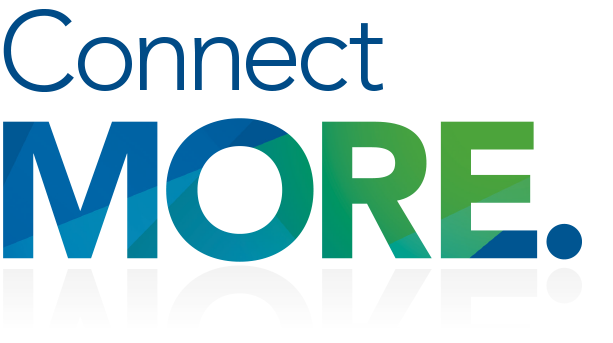
Georgian specializes in work-integrated training.
Build your skills and experience with local employers through exceptional clinical placements in health-care settings in Central Ontario.
Georgian is
MORE than an education
– it's an EXPERIENCE.
Explore student life, campus services and supports to see why you should be here now.

Frontline Support:
Health-care Heroes Closer to Home
The Frontline Support: Health-care Heroes Closer to Home campaign seeks to raise more than $3 million to renew facilities and equipment, transform technology, foster student success, and fund essential community-based research. Donate now!

READY to explore your future career in nursing?
Connect with Kailey, Student Recruitment Specialist, to discover more about Georgian’s four-year BScN degree program and get answers to your questions.
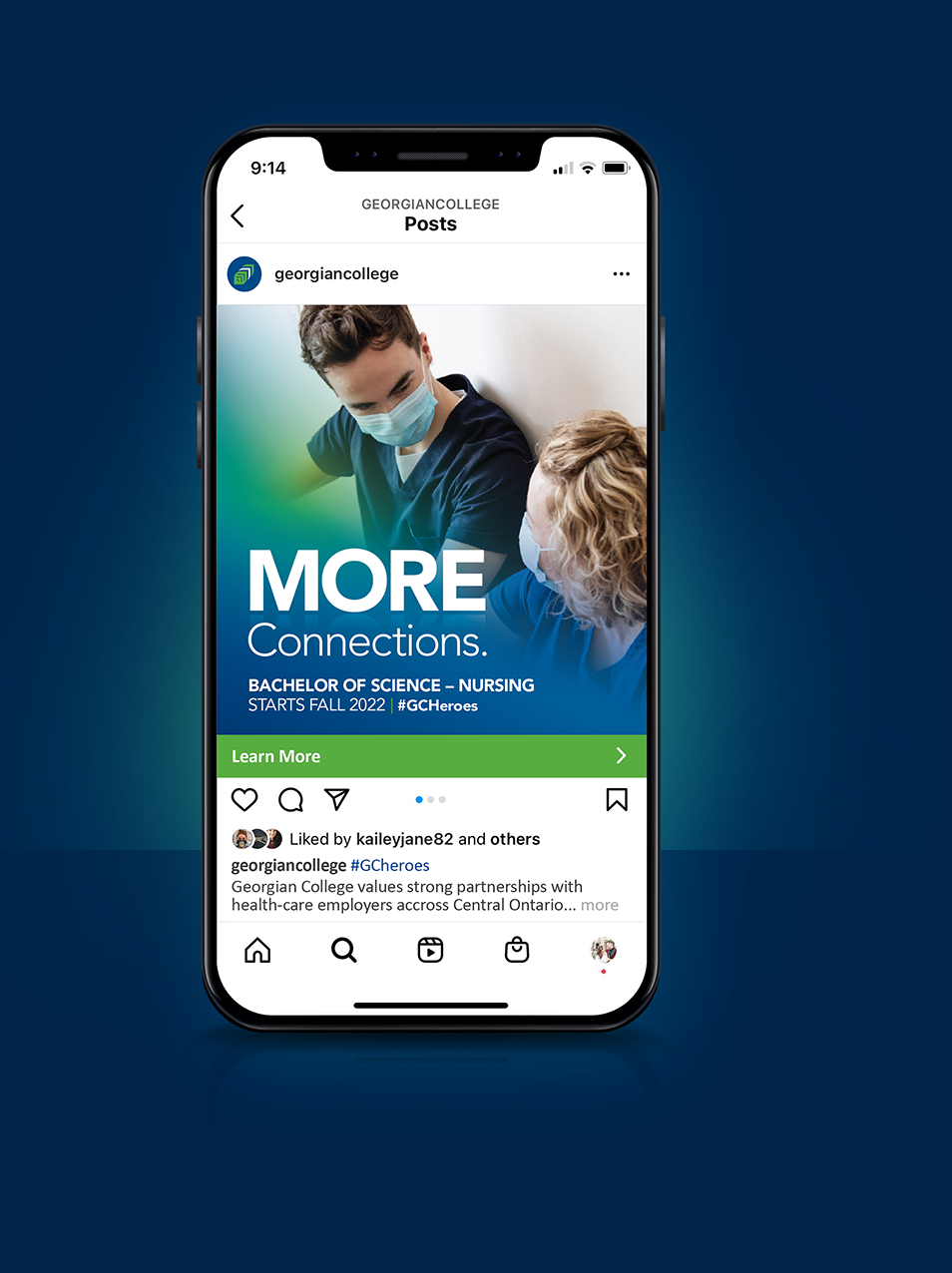

RECOGNIZE the health-care heroes in your life who wear an invisible cape!
Do you have a story to share about a health-care hero making meaningful impacts in your community?
Share your stories, gratitude, photos, videos and more by using the hashtag #GCHeroes on social.
One Georgian Dr., Barrie ON L4M 3X9 | 705.728.1968 | inquire@georgiancollege.ca
Copyright © 2021 Georgian College.
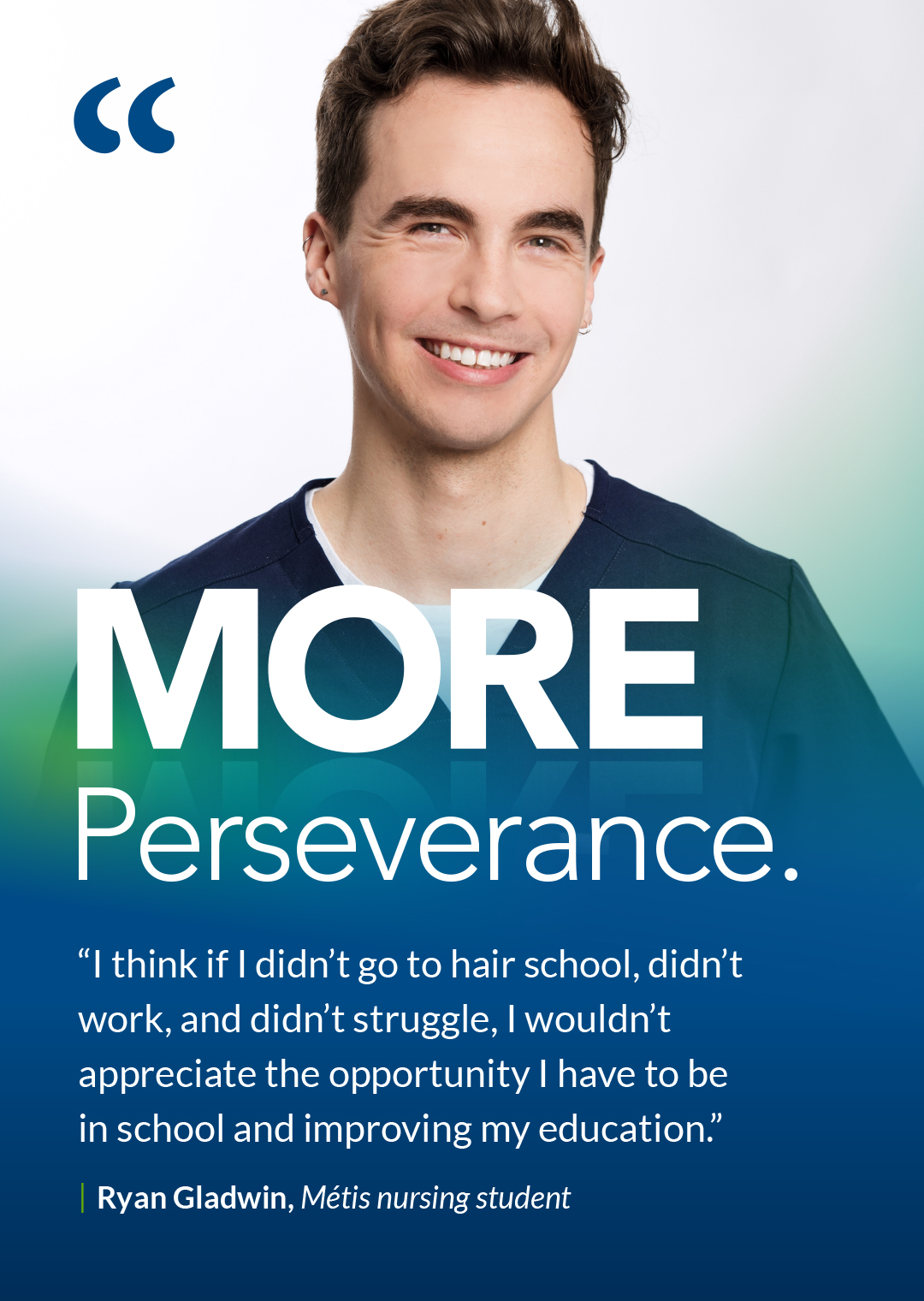
RYAN GLADWIN:
Overcoming barriers to become a nurse
I’m actually the only person in my family – my grandparents included – to go to university or college.I think it ties back to being Indigenous. I grew up in a family that was afraid of postsecondary schooling.
My grandfather was a residential school survivor. We never really quite knew what his trauma was, but my mom grew up understanding that postsecondary education was not a good thing.
But I remember there was a point in my life when I started to realize postsecondary might be the right path for me.
I had to overcome my parents’ desire for me to just work and just find a full-time job and just do that. I tried that path. And it just wasn’t for me.
A very pivotal moment for me was my high school graduation. I was working that day, so I didn’t go. And I was working in a hair salon. I was very thankful. I was able to have some amazing opportunities in that realm. But my peers were getting ready to accept their offers from university.
I remember thinking to myself, “I can do that, too. I’m smart enough. I’m good enough.” I just knew at that point that’s what my path was supposed to be.
As I talk about it and look back, I realize I was very lucky. For a long time, especially as a mature student, I felt I had wasted so much of my life.
It wasn’t until last semester when I was in hospital as a nursing student in practical that I had this moment that I realized that everything I’ve done – the things that I didn’t think were meant to be my future – have all contributed to me being who I am in this moment right here.
I think if I didn’t go to hair school, didn’t work, and didn’t struggle, I wouldn’t appreciate the opportunity I have to be in school to be improving my education.
As an Indigenous student, I feel an immense amount of responsibility to my community, to pursue jobs that are service oriented that will help other people. Our community is in such need of that.
Ultimately, I want to pursue my Nurse Practitioner. And I want to serve Indigenous northern communities.
I’m Métis. My family comes from Drummond Island. I find a lot of Métis people don’t want to talk about their heritage; they were ashamed of it.
I find a lot of Métis people live in this in-between where they don’t really fit in a First Nation, and they don’t fit in with, you know, colonialism.
My mother always had questions about who she was and who her family members were, and she spent many, many years trying to trace lineages. Now, thanks to her efforts and historical documents, we can trace our family back to the 1600s.
I saw how important it was to her and, in a sense, it became important to me and to my family and my community, to understand that I was a young Indigenous individual.
Every time I connect with other Métis or Indigenous students, my path becomes clearer.
To all my teachers, thank you for sharing your knowledge, expertise and wisdom:
Avinash Thandani, Lesley MacMaster, Kevin Armstrong, Corrine Lalonde, Stephanie Atthill, Deb Witmer, Yvonne Galbraith, Elizabeth Salvati, Len Lefaive, Alicia Sedgewick, Rosie Heal, Kelsey Jarvimacki, Kerry Zimmer and Mary Margaret Enwright.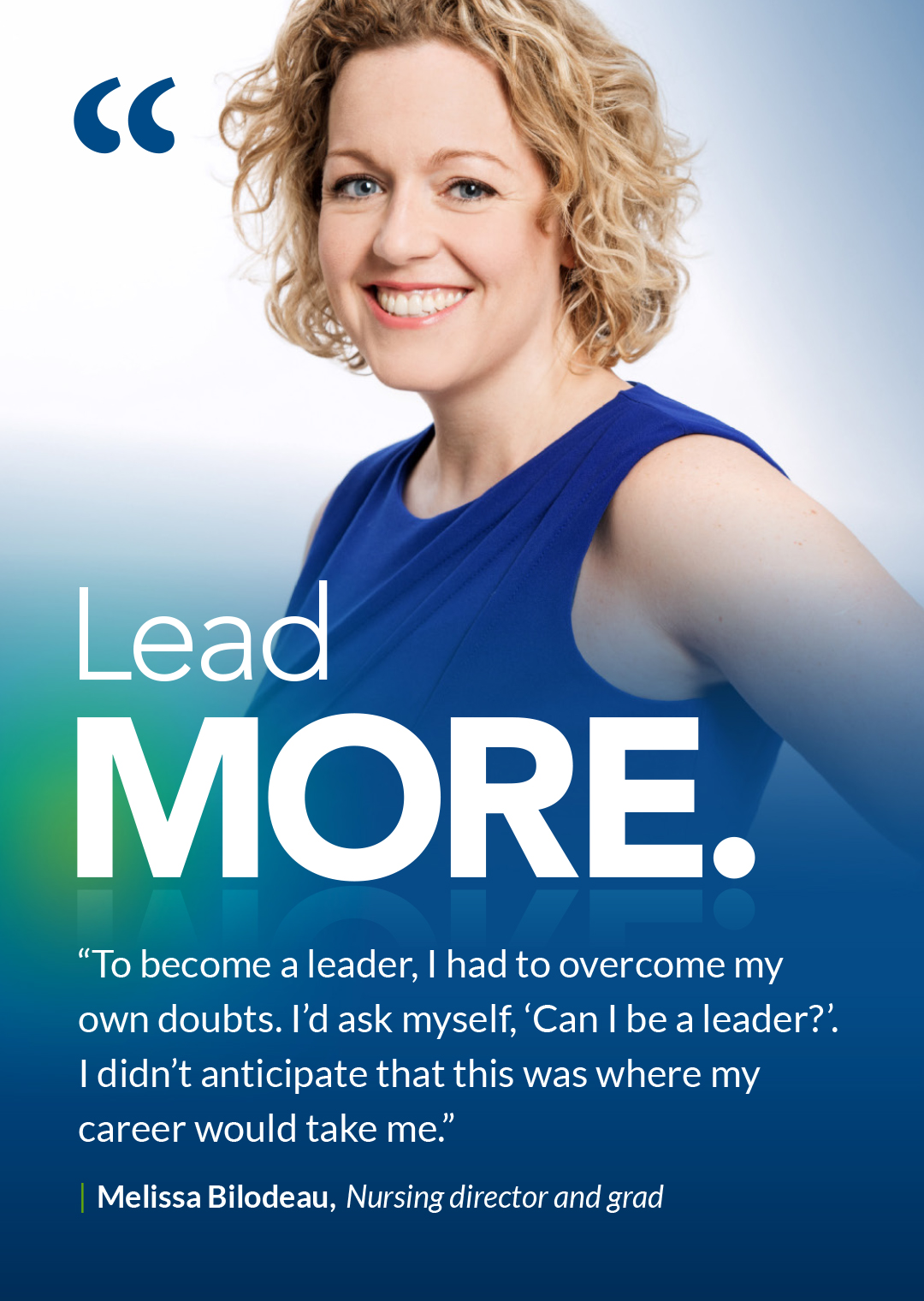
MELISSA BILODEAU:
Learning, leadership and love of nursing
Meet Melissa.She’s the Director of Nursing and Clinical Services at Muskoka Algonquin Healthcare (MAHC). She oversees nursing portfolios and nursing clinical education, working with her team to develop and implement standards, goals, policies and procedures to ensure standards of nursing care are met. Her goals are to improve quality care and decrease risk, while ensuring continuity and consistency of care delivery and effective use of resources.
Melissa is a graduate of the BScN collaborative program run by Georgian and York University, having completed two years of study at each institution.
Tell us about yourself.I grew up in Gravenhurst and Bracebridge. I moved to Barrie and Toronto for school, then back to Muskoka for work. I’m now raising my family in Bracebridge.
I completed the collaborative BScN program in 2007. In 2008, I got my Critical Care certificate. I completed my Master in Nursing (MN) in 2017.
What motivates you?What motivated me when I started nursing is very different from what motivates me now.
When I first graduated, I was motivated to learn everything I needed to know to care for the patients I was responsible for. As I continued, I was motivated by new challenges in the ICU. Now, in my current role, I would say I’m highly motivated to improve quality patient care and help to develop strong nursing teams.
However, the constant has always been learning. Nursing is a profession of continued learning and not a day goes by that I don’t learn something new.
What challenges did you overcome to get where you are?There’s a lot involved in going back to school and working full time with young kids. You kind of feel guilty that you’re not giving your work 100% or that you’re not spending enough time with the kids.
There are also challenges with having young kids and working shift work. Daycare doesn’t always fall at the right time. Sometimes you leave on an ambulance transfer at 4 p.m. and you get back at 9 p.m.
I was really lucky because I had a lot of support. We had a live-in caregiver when my kids were little and my parents helped out a lot. They went to daycare once in a while. But when I was doing my MN, at least once a week I would start my homework at 8 p.m. and wouldn’t be done until 11 p.m. – sometimes 2 a.m.
To become a leader, I had to overcome my own doubts. I'd ask myself, “Can I be a leader?” I didn’t think this was where my career would take me. But I was looking for a bit of a change and a challenge. At the time, the position also fit better with my home life balance, as my kids were young.
I didn’t anticipate falling in love with leadership and enjoying the position so much that I would develop the drive to pursue further career growth. It was the best decision I made.
What are your greatest achievements?My greatest achievements are my family, very supportive husband, two amazing children and three stepchildren.
Demonstrating to my kids that lifelong learning is so important and that change and pushing yourself further is worth it. Demonstrating that trying new things, even when you may fail, is important.
Why did you decide to become a nurse?I wanted to be in a profession where I was helping people. Nursing is in my family. My mom is a nurse, my two aunts and a cousin as well.
I love that there are limitless opportunities to continue to challenge yourself. You can change the type of patient, from medical to chemo, ICU, cardiac or neuro. You can change units and go from caring for a wide range of patients to something very specialized. You can switch from caring for an adult population to caring for neonates.
A nursing degree also provides a great foundation to move in other paths such as research, policy development, leadership, teaching or even legal consulting.
Why do you think the new BScN program is needed?I loved the faculty at Georgian. It felt like a family. The professors really looked out for me and pushed me to work my hardest.
To have a full BScN program at Georgian is amazing news for our area. It creates access and opportunity for more students to pursue a nursing degree.
Having to transition to another school halfway through your degree is difficult. You’re dealing with a new campus, new student card, new housing, new systems and faculty. Also, living in large urban areas is expensive and housing alone may pose barriers to many students wanting to pursue a BScN.
What are some of the challenges nurses face in this pandemic?The thing with COVID-19, especially in the beginning, is that guidelines and provincial directions change constantly with new evidence. There are lots of challenges as we constantly work to make sure that people have the most current information when they’re starting a shift.
There’s also a lot of pressure. You want to make sure you’re providing the best care you can in any given situation. Nurses work hard to achieve that. It’s easy to forget what they’re struggling with at home. Nurses have the same challenges as everyone else. They’re missing their families and friends. They can’t go out. They have kids. Some are single and missing their social lives. It’s tough.
My nursing heroes are my colleagues at MAHC who show up every day and work so hard to provide amazing care to our patients.
I’m also so thankful for the nurses and leaders who taught, guided me and took the time to help me grow.
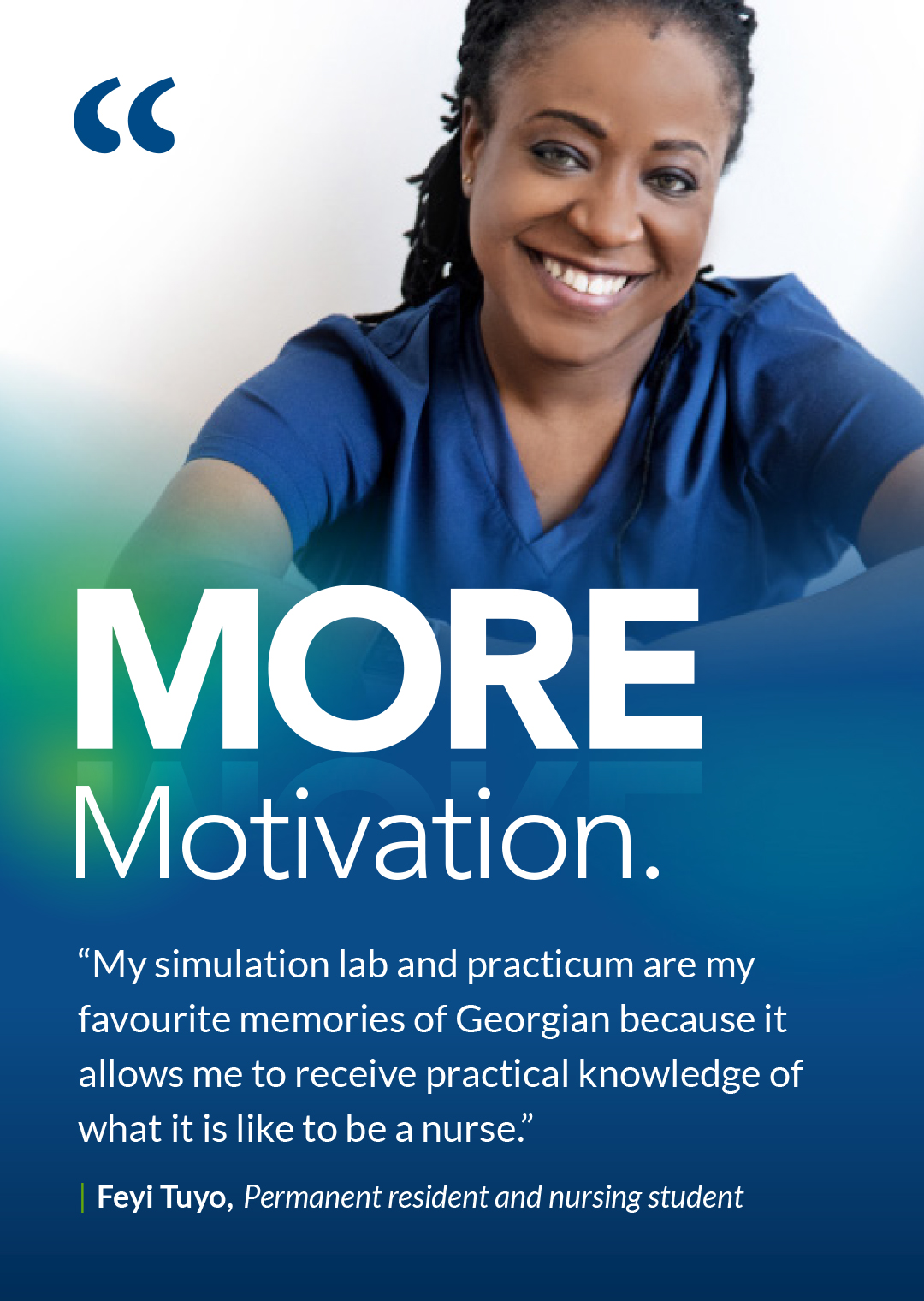
FEYI TUYO
Lack of infrastructure in home country leads to nursing career.
What challenges did you overcome to get where you are?I grew up in a country that lacked infrastructure and amenities, which hinders the youth and does not allow them to reach their full potential.
I promised myself I would soar through these obstacles and rise above the limitations. To achieve this, I educated myself to the best of my ability. This allowed me to assess the Canadian permanent residency program through the point-based system.
Why did you decide to become a nurse?My younger sister died after childbirth, and the cause of death was hypovolemic shock from post-partum hemorrhage. Her death could have been averted if there were adequate medical facilities and education in place.
This life experience made me realize that many lives are lost due to negligence, and I promised myself that I would be part of the change process by getting educated as a registered nurse in so doing helping people to the best of my ability.
What are your greatest achievements?Personally, being the proud mother of two kids is my most outstanding achievement.
Professionally, going back to school to earn a second degree that would lead to my ultimate goal, which is to be a Nurse Practitioner.
Who are your nursing heroes?At the moment, I have three nursing heroes.
- Mary Eliza Mahoney, the first African American to study and work as a professionally trained nurse in the United States of America.
- Dr. Crystal Garvey, a Canadian nurse and my professor at Georgian College, is currently earning a Ph.D. at Queen’s University. She enjoys volunteering and speaking to at-risk youth, athletes, and allies to empower, educate, and inspire anti-bullying and anti-black racism.
- Kemi Shodunke, my cousin and my mentor. She is currently earning a Doctor of Nursing Practice degree as a Family Nurse Practitioner.
Why did you CHOOSE Georgian?
After research and talking to students and facilitators of the faculty, I knew Georgian was the right place for me. I want to learn from the best people to be stretched intellectually and creatively, and I knew Georgian would provide this and much more.
What is your favourite Georgian memory?My simulation lab and practicum are my favourite memories of Georgian because it allows me to receive practical knowledge of what it is like to be a nurse.
Why should Georgian offer a stand-alone nursing degree program?Georgian is a great place to learn because of the community involved in the educational process. Faculty members are very engaging and accommodating, which creates an inclusive learning environment.
Students who enrol in the new program will enjoy a very engaging and interactive learning experience, which will promote a better learning environment. I am very confident that the product of this close-knitted approach would be well-read and versatile students.
What was your placement like? How will it benefit you?My placement has been unique; I learnt a lot from the Stroke and Rehabilitation unit and the cardiac-renal unit at RVH. The nurses were ready to teach, and I was prepared to learn.
My placement benefited me because I could integrate theory, practice together, learn about cultural competence care, and learn from nurses’ clinical reasoning.
How has the pandemic affected your view of nursing? and nurses?The pandemic made me realize that my love for nursing is much more than I thought it was. Nurses are heroes – my superheroes. They are an integral part of the community as they are the frontline respondents during this pandemic.
They do not have the luxury to show fear, and they exhibit courage as they expose themselves to various contractable ailments.
Have your children inspired you?My kids are constantly learning every day; the joy of learning new things intrigues them. This has made me realize that if a young mind can process data and convert it to information, the adult mind needs to be more relaxed and focused on achieving the same result.
Being a mom and student has been challenging but rewarding.








